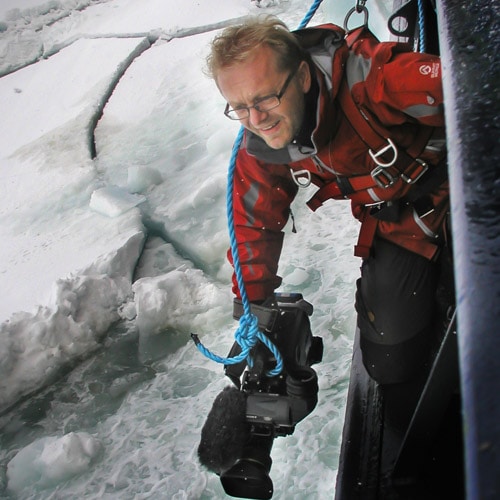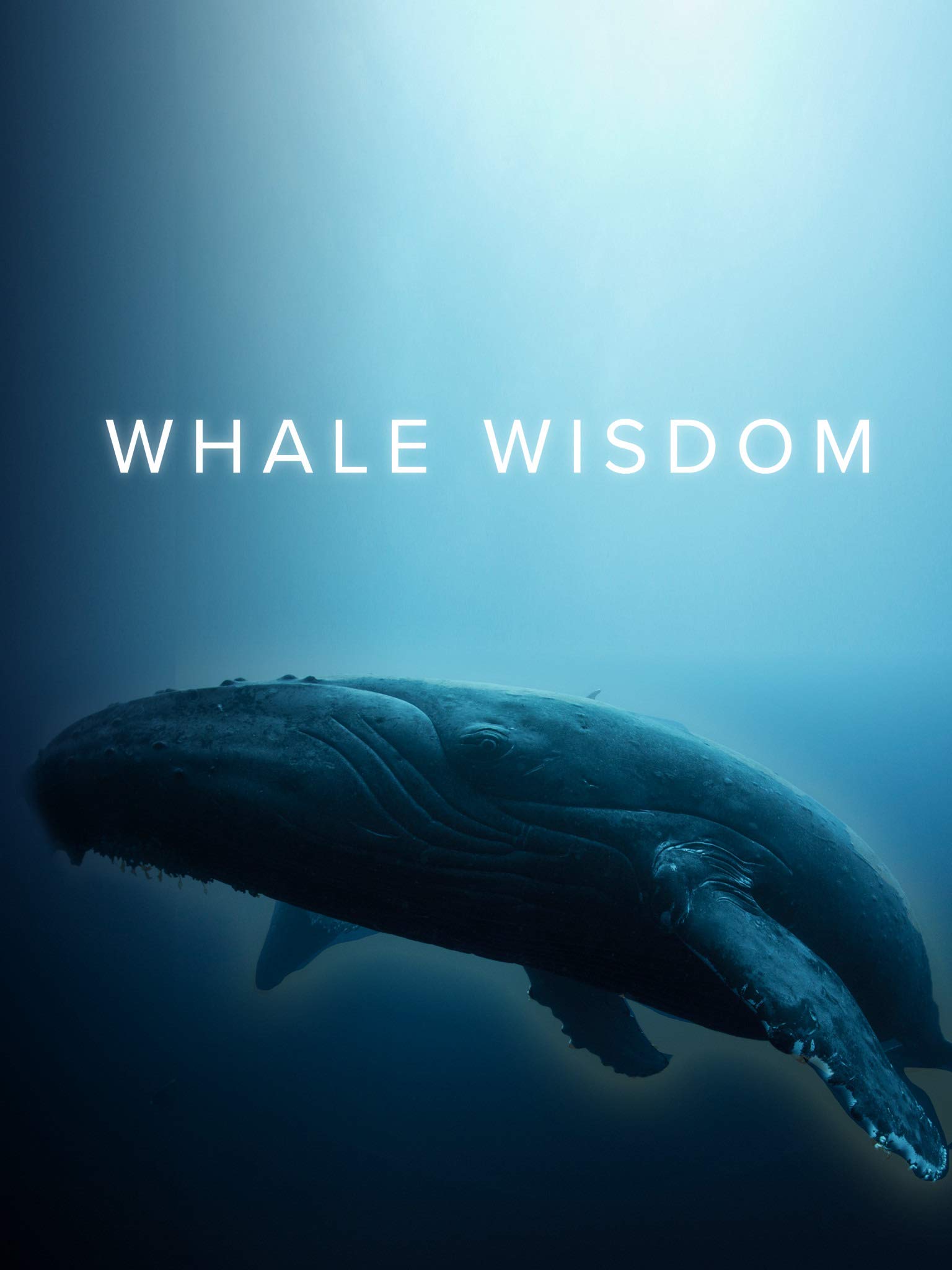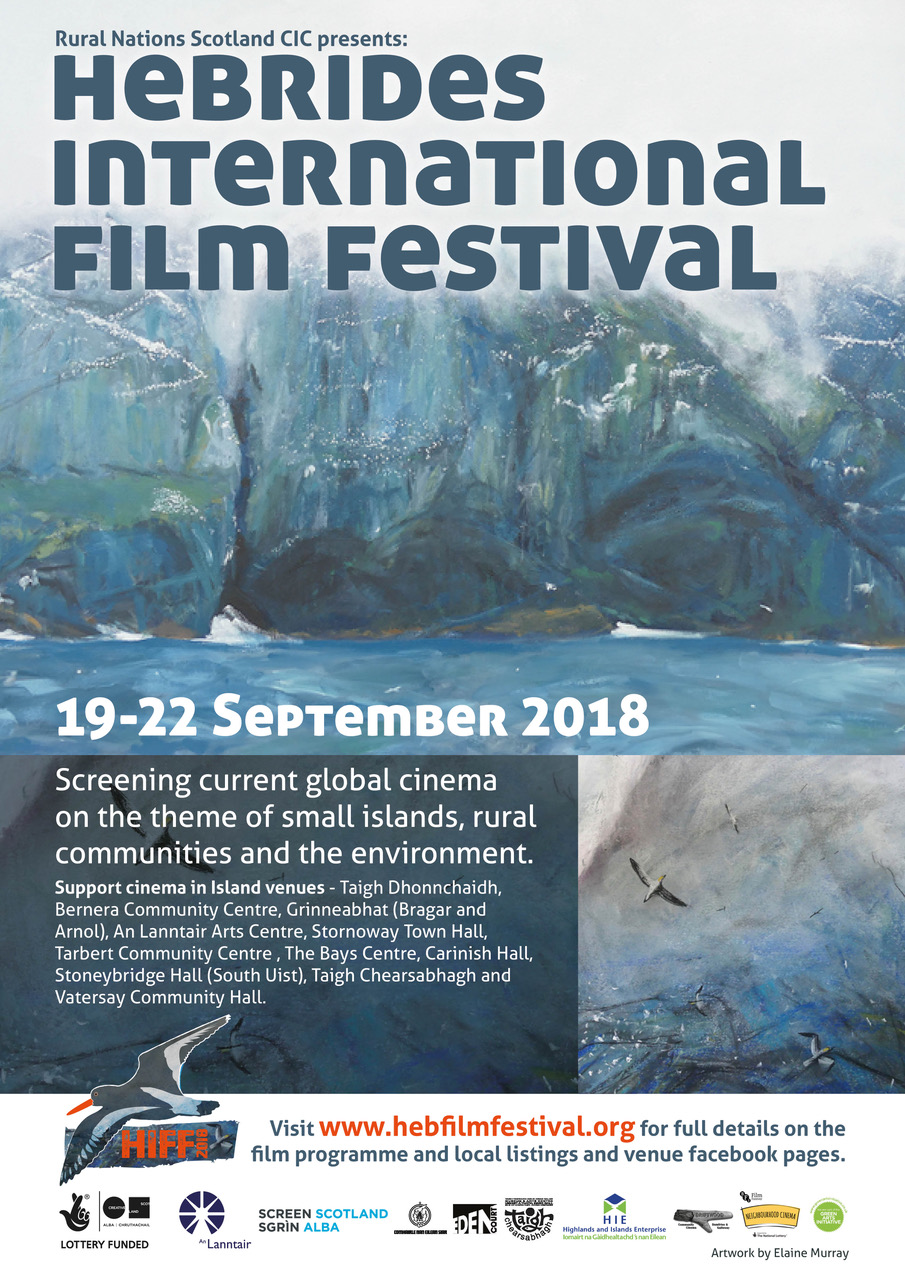HIFF LATEST NEWS
21/07/2021
Seas of Plastic, with Emily Penn - HIFF Lecture 2021: CLICK ME
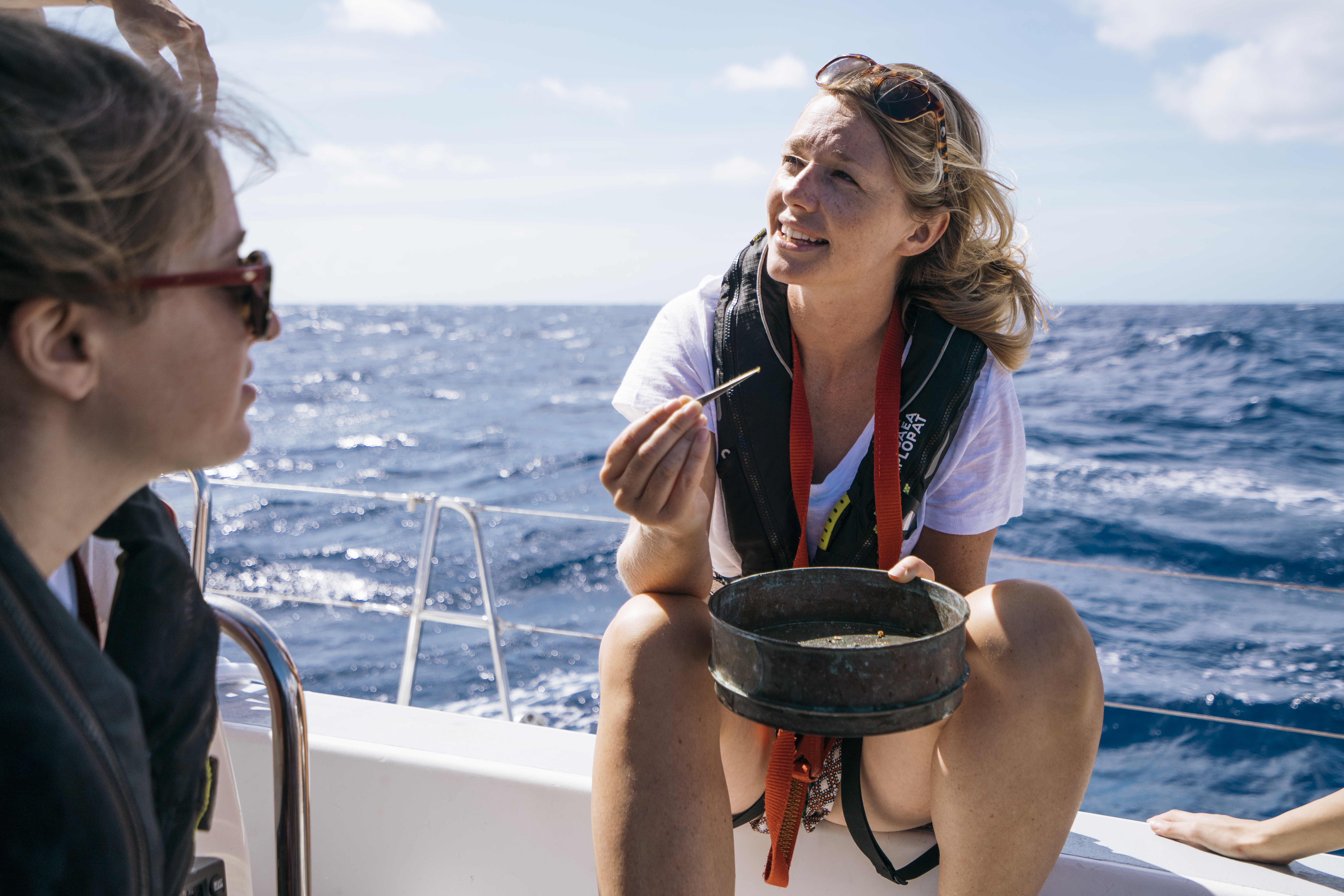
Emily Penn’s journey to become an ocean advocate and campaigner against the impacts of plastic waste in the marine environment, began unexpectedly.
Emily originally qualified as an architect and she had the opportunity of a new job in Australia.
Not wanting to increase the carbon burden in the atmosphere as she journeyed to her new home and work place, she instead set about finding a way of travelling to the other side of the world with as small a carbon footprint as she could manage.
The answer was an epic sailing voyage that took her across the Atlantic and the Pacific oceans, and which took her to many small islands in the Pacific en-route.
This journey lead to a decision not to take that new job but instead to address the problems with ocean plastics she saw as she sailed to the other side of the world.
Emily Penn returned to one island she had visited on that journey, Tonga, and set-about addressing the astonishing problem the island had with a mountain of plastic waste.
That resulted in a campaign to clean the islands beaches, and in one clean-up session 56 tonnes of plastic waste were cleared from the beach in five hours, and that was shipped in 3000 sacks to be recycled and to safe landfill.
Emily’s journey lead her to explore where this mountain of plastic waste had come from, and why so much plastic waste is used in our daily lives
The outcome - a deep understanding of the mismatch in material science and the use of plastic in products, the use of a material designed to be used forever, but which we often use just once.
Started visiting and researching the huge plastic gyres in the world's oceans, to see what was there and what could be done to clean up these accumulation zones for plastics.
But where was the rest of the world's plastic going? It was there but it wasn't visible. Emily's expeditions found that the plastics had fragmented into tiny pieces, micro plastics - trillions of micro plastic fragments in the ocean - maybe 5 trillion on the surface - but what of those beneath the waves? They started finding these fragments in fish caught in the oceans, and asked where these these plastics entering the food chain of humans?
Emily Penn then looked inside her body for these toxic pollutants used when we make plastics - tested her body for 35 chemicals banned by UN for their toxicity - and found 29 of them in her blood.
This was not happening somewhere else, it was happening now and here - a scary indicator of the direction in which things were heading.
Emily Penn than started ‘Exxpedition’ - all female voyages undertaken to understand more about plastic and toxic pollution.
But what is the solution to this growing problem?
Emily Penn states:
Ultimately its billions of micro particles that have caused this problem of plastic getting into the sea, but it is also micro actions from every one of us that is going to reverse it.”
An experienced public speaker, Emily has spoken around the world at TEDx conferences, universities and global companies, sharing both her adventures and an understanding of the issues relating to our oceans, human mindset and future society.
Emily was honoured with the Fitzroy Award at the 2016 Ocean Awards and is also the youngest and only female recipient of both the Yachtmaster of the Year, awarded by HRH Princess Royal, and the Seamaster of the Year award. She is a Fellow of the Royal Geographical society and in 2017 was elected as a member of the Cordon Rouge Club.
21/07/2021
Masterclasses for Filmmakers - CLICK ME
This year’s Masterclasses are being given by award-winning documentary directors and filmmakers Kenneth Sorento, Director of The Fight For Greenland, and by Rick Rosenthal, Director of Whale Wisdom.
The Masterclasses will be available online at the Festival’s website (hebfilmfestival.org), and with a live Q&A session with Kenneth Sorento (via Zoom, link on website) hosted by Festival Programmer, Muriel Ann Macleod, at 2pm Thursday 22 July.
Rick Rosenthal’s Masterclass will be an online interview recording with media journalist Peter Urpeth.
Muriel Ann Macleod said:
“The Masterclasses are an important element of the Festival’s programme, and reflect our commitment to developing filmmaking in the islands, and to wider understanding of the processes of making documentary films about climate and environmental issues was well as our key themes of island and rural communities.
“Both Kenneth and Rick are award-winning directors with an amazing commitment to producing documentaries that promote understanding and change on these key issues.”
The Fight for Greenland and Whale Wisdom are showing across the Festival, full programme details at our website.
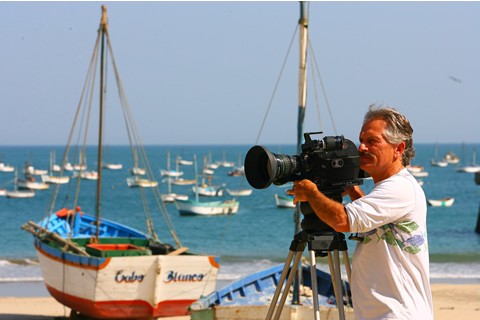
Kenneth Sorento is a Danish cinematographer and director. He graduated in film, TV and video making from Copenhagen Technical College in 1999. Kenneth specialises in expeditions and making documentaries in the Arctic Region. His film, The Fight for Greenland won the main prize at the pitch forum Below Zero at Toronto International Film Festival in 2017 and was scheduled to be the opening night film of CPH:DOX in 2019.
The Fight For Greenland follows four strong, young Greenlanders, who each in their own way insists on taking responsibility for the future of their country. The documentary explores the difficult balance between the fight to self-determination and xenophobic nationalism between traditional culture and globalisation.
During his Masterclass, Kenneth discusses his motivation for making a film about four young people fighting for their homeland. He will discuss his process, how he finds his characters and builds trust as well as finding the story within hours of footage.
Rick Rosenthal is a trail-blazer in terms of filming in the open ocean – the waters far from land and thousands of feet deep and over the years, he has filmed some of most challenging marine wildlife subjects on our planet.
Among his achievements are three award-winning programs on the great whales – Riddle of the Right Whale, Humpback Whales and Sperm Whales Back From the Abyss for the BBC, together with Whale Wisdom, produced by Wild Logic, for Terra Mater.
All four programs were made in collaboration with Sir David Attenborough.
Beginning his career as a marine biologist at California’s Westinghouse Ocean Research Laboratory and then at Scripps Institution of Oceanography, Rick left the warm weather behind for the adventures of Alaska.
With colleagues, he pioneered underwater research along Alaska’s remote outer coast, and Rick has authored and published more than 45 scientific papers and popular articles on marine biology, ecology and animal behaviour.
Underwater camerawork played an essential part in Rick’s marine research. Aiming to share his observations with the wider world, Rick turned from research to filmmaking and television.
Whale Wisdom acknowledges that whales have long been a profound mystery to us. They live in a world so removed from our own that we can barely imagine their lives. Their environment is different, their senses are different, their relationships are different.
Captured on camera for the first time in Whale Wisdom, Rick films the astonishing behaviour of a humpback whale which, time and again, manages to outwit humans in order to get what she wants – their fish. She brilliantly thwarts each attempt by the managers of a salmon hatchery to keep her away. Her coup de grace – slipping in and out unseen into an enclosure barely bigger than herself.
Marine biologist and filmmaker Rick Rosenthal is on a journey to explore these insights, measuring the latest science against his own observations and long-held beliefs – and just maybe, getting a glimpse of the world as it must seem to these ocean giants.
Watch this specially recorded Masterclass as Rick discusses where his passion for Whales and Dolphins came from and how he began this journey. He will discuss his process, which cameras he chooses and his experiences working with Sir David Attenborough.
Peter Urpeth
17/07/2021
First UK screenings of Haida Modern; an exclusive interview with director Charles Wilkinson.
Director Charles Wilkinson returns to Hebrides International Film Festival this year with the first UK screenings of his latest film, Haida Modern.
Haida Modern explores how the artist Robert Davidson brought Haida culture back to its people.
In the 50 years since he carved out his first totem pole, and saw it raised on Haida Gwaii, Robert Davidson has come to be regarded as one of the world’s foremost modern artists. And yet, in the insightful interviews captured in the film, he retains a remarkably soft-spoken manner and a charming humility that belies what an influential figure he’s become in both the realms of art and activism. In listening to his sage words and admiring his sublime handiwork, we come to understand how widespread appreciation of his art has stoked interest in the 14,000-year-old culture that spawned it and motivated non-Indigenous Canadians to support First Nations activists intent on defending their heritage and the land they hold sacred.
Screenings:
An Lanntair - Tuesday 20 July 2pm
Carinish Village Hall - Tuesday 22 July 2pm
Bernera Community Centre - Friday 23 July 5:30pm
13/07/2021
Tenacity of North Uist filmmaker sees feature drama open in his native islands.
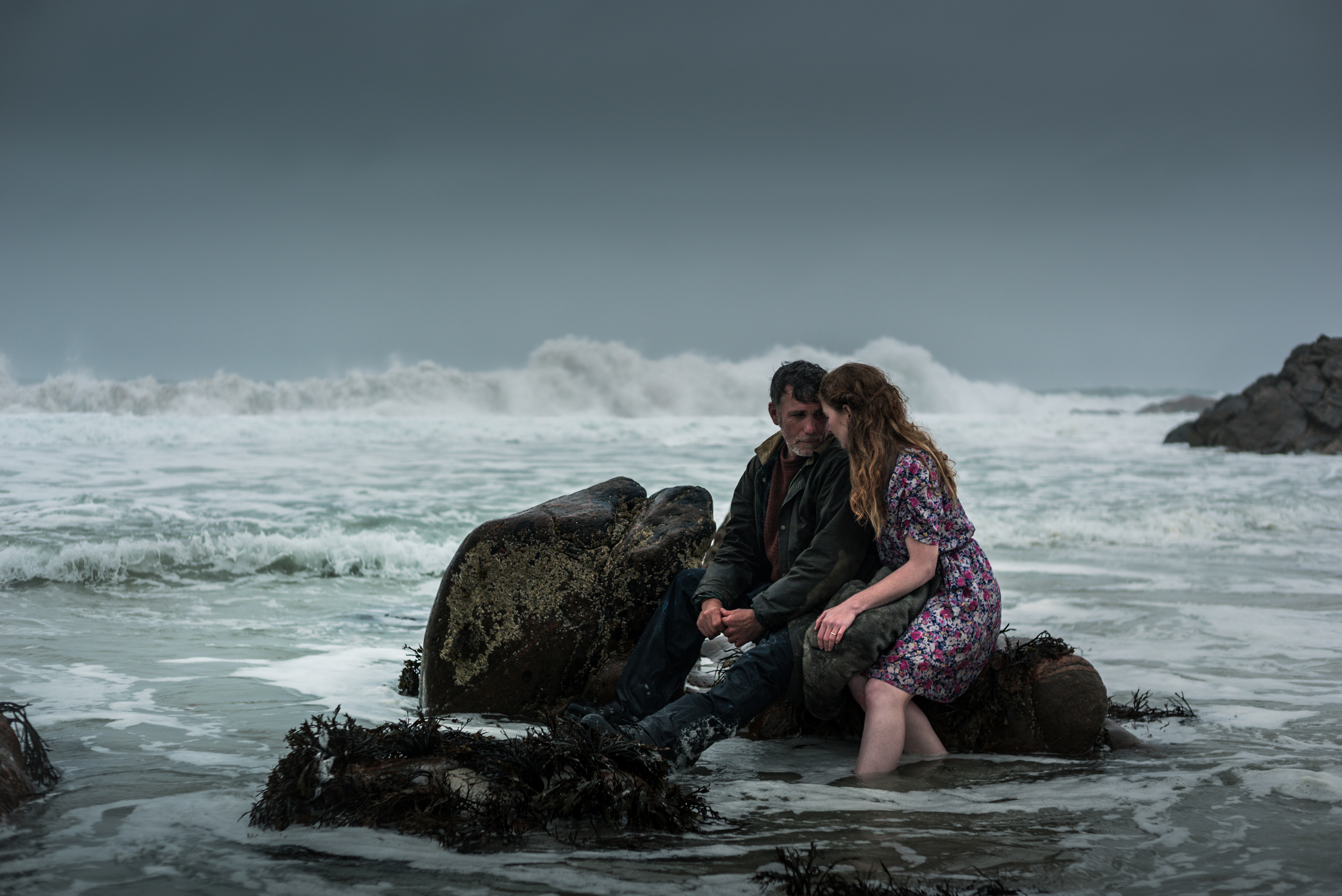
Hebrides International Film Festival 2021 is proud to present the World Premiere of Uisdean Murray’s Mara - The Seal Wife.
Uisdean Murray, who wrote and directed the film, hails from North Uist and Mara has been his passion project for many years. Two successful crowd funding campaigns have brought the film to our screens, and one positive aspect of this approach to funding for Uisdean was that it meant he could keep control of the production and shoot it his own way - a factor that was important due to the ambitious nature of the story and the logistics of shooting in the remote Outer Hebrides of Scotland.
Mara - The Seal Wife is a magic realism tale inspired by selkie folklore. In the film, after giving birth to their child on a beach during the dead of night, Sine (Sarah Pritchard) runs into the darkness leaving her husband Magnus (Kevin Kelly) in a state of anguish. From here we journey into the past to seek answers behind Sine’s behaviour and discover the harrowing events of her past life that brought her into the realm of the selkies, the mythological creatures that take the form of seals but which shed their skin to take human form.
Uisdean Murray will be at the premiere at An Lanntair Arts Centre, Stornoway, Isle of Lewis on Tuesday 20 July, with a second showing of the film taking place at Kinloch Community Hub, Balallan, Isle of Lewis the following day.
On Thursday 22 July, Uisdean and producer Adam Keltie will be at the showing of the film on their home island of North Uist and will introduce the film.
Festival Director, Muriel Ann Macleod said:
“HIFF is delighted to be able to give Uisdean’s film its premiere in his native islands. The Festival is dedicated to strengthening the opportunities for island-based film makers to get their work made and shown, and the tenacity and commitment Uisdean has shown in developing this project to completion is very inspiring, as is his commitment to making a film that features the islands and the ocean mythology and culture they share.
“This year we can really celebrate the development of island-shot cinematic film in the Festival, as apart from Mara we have Alastair Cole’s Iorram and Limbo by Ben Sharrock. Going forward we really want to see much more investment in island made cinema both drama and documentary.
“Mara also features actors with island backgrounds and is in part shot in Gaelic, and I am sure that these screenings will be one of the real hits of this year’s festival.”
12/07/2021
Newly digitised 8mm films show rare archive of life on the Island of Berneray in the 60s and 70s.
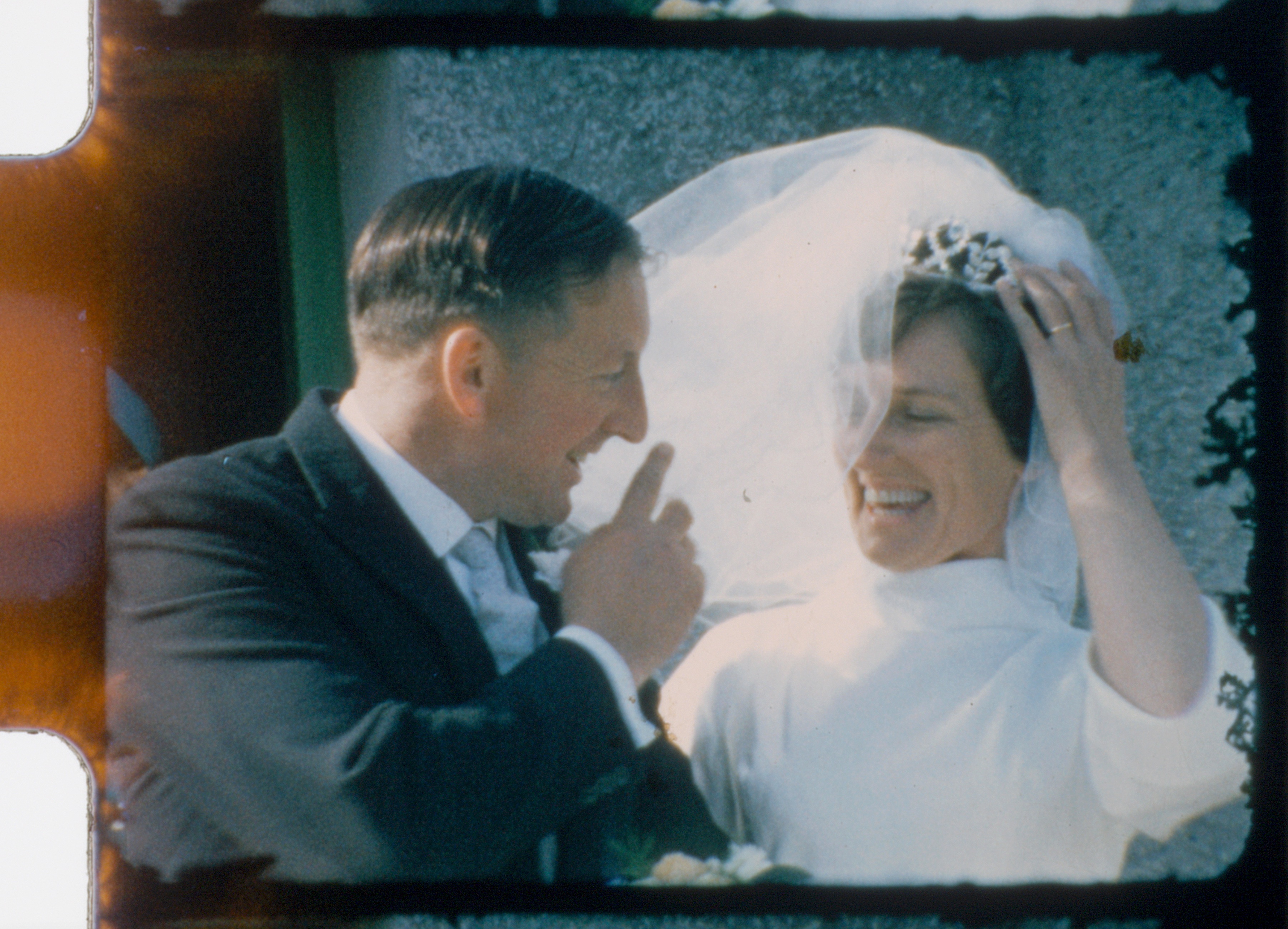
Hebrides International Film Festival 2021 is delighted to present screenings of a new assembly of rare, archive 8mm films from the island of Berneray, directed by Andy MacKinnon.
The original 8mm footage was donated by Gloria MacKillop to the Faodail | Found project archive based at Taigh Chearsabhaigh, North Uist, and has been digitised to a superb 4k definition quality thanks to the most generous donations to the projects recent crowdfunding campaigns.
The films were originally shot by Bill and Ann Scott between 1960 and 1978 during their annual holidays home, and document many aspects of island life at that time, including sheep shearing on the small islands in the Sound of Harris, the arrival of the coal boat and often repeated scenes of leaving Berneray from the pier.
Festival screenings will feature 30 minutes of extracts from the collection, and come with the very special revelation that the donated films contained footage of Gloria MacKillop’s own wedding in1968, which she had never seen before.
Andy MacKinnon, curator of the arts programme at Taigh Chearsabhaigh and director of the Uist Film project said:
“This is a beautiful collection of films shot on the island of Berneray during what was very much a time of change. There was no causeway then, the ferrymen are heavily featured in the film reels, and you see people over the two decades in which the film was shot growing, ageing, and there’s several younger people in the film who are still with us today. It has been great to get their reactions, and great to be able to identify lots of people and places in the film as well.”
In terms of why film archives are so important to local communities, Andy said:
“I think moving images are hugely important along with other historical artefacts and documentation - and I would say the more indigenous moving images really give us a window into life at that time and what it was really like. There has been an enormous amount of change, especially in the islands over the latter part of the last century and it is really important to be able to show that, and for people to see from that indigenous perspective, as so many other films tended to romanticise life in the islands.”
Hebrides International Film Festival 2021 is proud to be able to have five showings of the film during this year’s festival, including a very special event at Berneray Community Hall, North Uist (Monday 19th July, 5:30pm) featuring a discussion with Archive Project Director, Andy MacKinnon, and with live music accompaniment from Kenny John Mackillop on the accordion.
Screenings at An Lanntair, Stornoway, Kinloch Community Hub, Isle of Lewis, Carinish Village Hall, North Uist and in Castlebay Community Centre, Isle of Barra will have a spec tally created soundtrack from Uist and Benbecula Fiddle and According Club.
05/07/2021
Hebrides International Film Festival 2021 brings a celebration of global cinema to the Outer Hebrides.
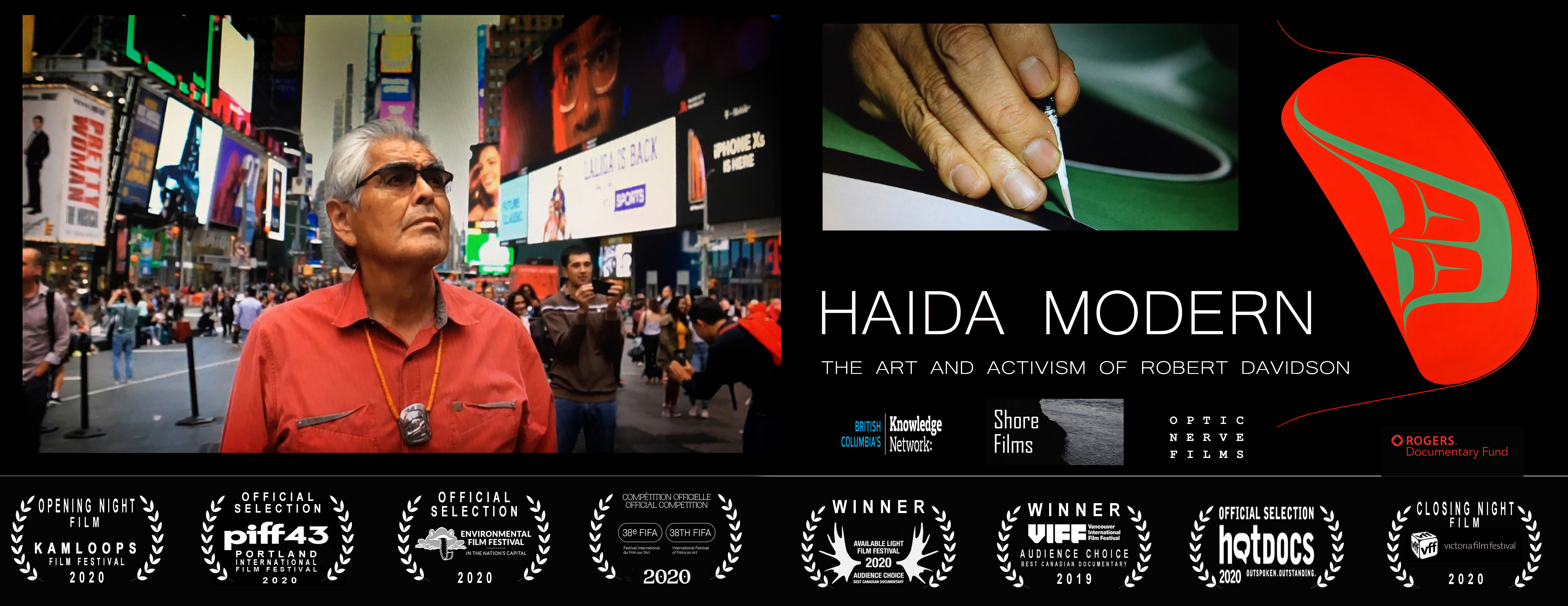
Now in its seventh year, Hebrides International Film Festival (HIFF) is back, and is set to bring a celebration of independent global cinema to venues across the Outer Hebrides.
From 19-24 July, 43 films from 16 countries will be shown in 10 venues along the chain of islands from the Port of Ness on the Isle of Lewis to Castlebay on the Isle of Barra, with UK premieres of the multi-award-winning Haida Modern (Canada) and Manry at Sea (USA), and screenings of Iorram (Scotland) the first feature length documentary for cinema presented entirely in Scottish Gaelic.
The programme also brings Ice on Fire - produced and narrated by Leonardo DiCaprio - to Hebridean audiences. The film asks: Are we going to let climate change destroy civilisation, or will we act on technologies that can reverse it?
In this iteration, HIFF continues its central themes of environmentalism and the fight for survival of island communities and cultures around the world, and the programme proves once again that for HIFF, the global is truly local.
This year’s film programme has four strands - feature documentaries, drama features, children’s features and a strand for new short films. All films have been produced within the last three years, highlighting HIFF’s unique relevance and its exploration of contemporary struggles with the impact of climate change and how island communities, in particular, are fighting back.
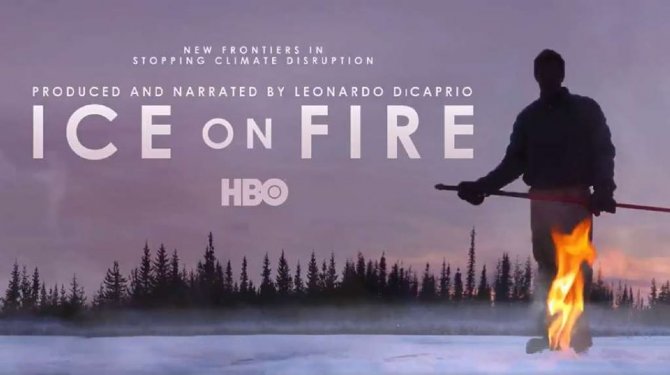
Amongst the countries of origin of films in this year’s programme are new features from Greenland, Turkey, Japan, Ireland and South Africa, along with New Zealand, Australia, Spain, Denmark, Latvia, Romania and from across the UK.
With last year’s event wiped out by Covid-19, this year’s festival goes ahead in a sense of a celebration of the resilience of island communities in the face of adversity, and even features HIFF’s first outdoor screening programme.
Festival Producer, Muriel Ann Macleod said:
“HIFF’s programme this year highlights how many communities are adapting and making change to try to reduce their carbon footprint and to preserve the planet. Many contemporary film makers are focusing on positive solutions and on the practical changes we can make rather than just telling us about the problems.
“The amazing dramas featured in the programme connect us with communities across the globe. The human issues in Fire Will Come or Losing Alaska are not so different from Island life where many communities and local people are living in areas where the global climate crisis is making a much greater impact.
“HIFF 2021 explores these themes through profound insight, through celebrations of the resilience of island communities, and through fearless independent film-making that not only engages us with untold stories, but entertains and enthrals us and with relevance to us all.”
This year’s programme also features on-line film masterclasses from Kenneth Sorrento, Director, The Fight for Greenland and Rick Rosenthal, Director of Whale Wisdom.
Full details of this year’s programme are available here: CLICK ME
All screenings taking place at An Lanntair, Stornoway can be booked here: CLICK ME
Screenings at all other island venues will be available through Eventbrite here: CLICK ME
All showings must be pre-booked. Social distancing regulation compliance is in force at all venues.
21/03/2021
HIFF IS BACK IN 2021!
Due to its remote location and rural community setting, The Hebrides International Film Festival is one of the most unique live-screening international film festivals in the world. This makes us think about what it means to showcase films to remote audiences like ours, and we are passionate about exhibiting new narratives, perspectives and experiences in film. Audience feedback has always been the key driver of our programming, and led to the creation of our annual theme of Islands, Environments and Remote Communities. The documentaries and dramas we present are curated especially for the Islands audiences, they are current, made in the last 3 years and reveal and celebrate small communities, remote landscapes and the environmental issues that matter to them.
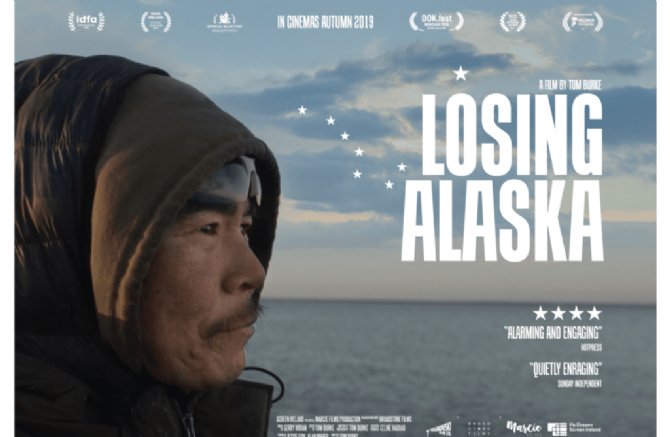
Among the many topics featured most commonly in our programme is the issue of climate change, which is a growing concern for many residents of the Outer Hebrides. The future impact of rising sea levels is of particular concern, and is a problem that is realised daily in communities across the globe. Look out for screening information for films like Losing Alaska and Lowland Kids, which tackle this issue head on.
This year we are not just profiling aspects of the climate emergency many of the films offer realistic solutions and changes we can make to adapt and mitigate against climate change. Film like Kiss the Ground and Current Sea offer real solutions around action we can all take to adapt to Climate change. HIFF always presents strong dramas in support of our documentaries and this year films like Dark Waters (where the story dramatizes Robert Bilott's case against the chemical manufacturing corporation DuPont after they contaminated a town with unregulated chemicals) and award winning Nomadland which reflects on the lives of modern day nomads in the US.
Every year we present a childrens programme of both damas and shorts, and this year the selection includes Togo and the wonderful animation Wolfwalkers.
The Coronavirus pandemic, and the restrictions it has placed on our ability to gather socially, has presented HIFF with new challenges. Thankfully, these restrictions have led to new innovations in public film viewing, so as well as screening indoors in larger venues like An Lanntair under social distancing we plan to also deliver small screenings outdoors at some of the rural venues. To increase the reach of the Festival HIFF will deliver six of our best environmental documentaries online on Video on Demand. We also remain determined to bring the festival to as many of our remote venues as possible, where it is safe to do so.
Every year at HIFF, we host live film makers masterclasses featuring some of the world’s most interesting film industry practitioners, usually the film makers visit the islands to talk about their work. This year the masterclasses will be filmed in advance for streaming during the Festival, you will also be able to meet the film makers in a Q&A streamed event. Stay tuned for more news; we are very excited to reveal our Masterclass participants for 2021.
This year also sees the start of an annual HIFF environmental lecture and a revival of our Photo competition.
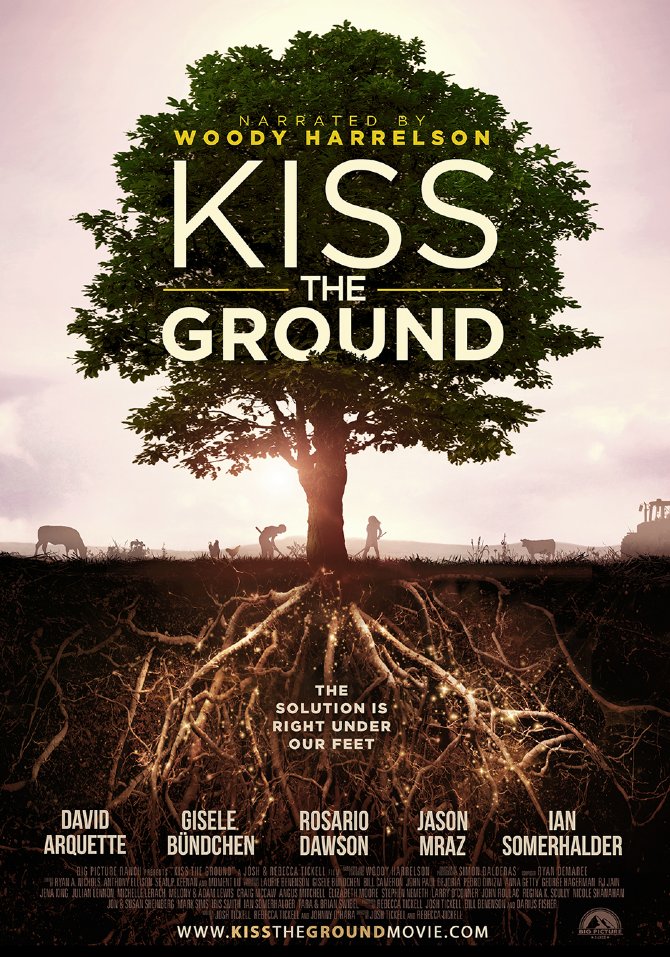
Information regarding venues, programmes and timings will be released over the coming months in our online programme. Our planned Festival dates are 19 to 24th July 2021.
As always, stay up to date with everything HIFF here on our website and on our social media below.
Follow us on Twitter: @HebIntFilmFest
On Instagram: Hebrides Int Film Fest
And on Facebook: @HebFilmFestival
12/09/19
STAR CHEF'S PLEA TO LOOK AFTER HEBRIDES

An Lewis-born chef and TV celebrity appearing at the Hebrides International Film Festival today (Thursday) is urging everyone to take the festival’s environmental message seriously – so we can safeguard the islands for future generations.
The sixth annual film festival takes place in venues across the Outer Hebrides from today through to Saturday. This year’s theme is about islands, environments and remote communities, with a focus on the urgent need for everyone to take action on climate change and conservation.
Bragar-born chef Angus Campbell, who has enjoyed a lifelong career around the world, is back in Lewis this week from his home in the US and will be appearing at the film festival, both on screen and off. He will be giving a cooking demonstration in Ionad na Seann Sgoil in Shawbost at 6.30pm, ahead of a screening of Cooking With Angus: The Final Episode, which also shows in An Lanntair in Stornoway and Talla Na Mara in Harris tomorrow (Friday).
The programme reflects on his life as a chef and the influence of his island roots on his cooking, as well as on practical cooking techniques.
For nearly 30 years, Angus has lived in Grand Rapids, Michigan, and taught culinary arts at West Michigan University and Grand Rapids Community Council. While there, the media department in the college suggested he started a TV show, to help students learn how to cook, and a screen star was born, with the programme even winning an Emmy, American TV’s equivalent of the Oscars.
The Final Episode completed a series of around 120 programmes and Angus returned to Lewis last year to film it, bringing with him three illustrious chef friends, two culinary students – the show is based on the premise of him teaching students on screen – and a film crew.
Angus was delighted to be back in Lewis again this week, lending his support to the festival and its principles. He said the environment and climate change was “a subject that we should be paying a whole lot more attention to”.
He said: “It should be on the tip of everybody’s tongue because that is the only way we’re going to secure the island for future generations.
“If we want our children to see the island the way we’ve experienced it, we seriously have to take care of it in every way and I don’t want to think about, two generations from now, some of the great old solid recipes – cultural genius recipes that were created because of necessity – never being known any more because that would be criminal.”
Angus loves the old traditional recipes and intends to use produce from the sea in his cooking demo. He has been foraging for ingredients on the Shawbost shore – thinking about “what’s there but nobody knows how to cook anymore” – and was planning a stew with limpets, periwinkles, mussels, razor clams and dulse.
Film festival creative director and programmer Muriel Ann Macleod is delighted that Angus will be appearing personally at HIFF.
“His film is such an inspiring film because it’s really about his life as a chef, internationally, so I was really pleased when he offered to come and do a demo,” she said. “His subject is sea harvest and he’s harvesting from the shores. Who knows what he’s going to make?”
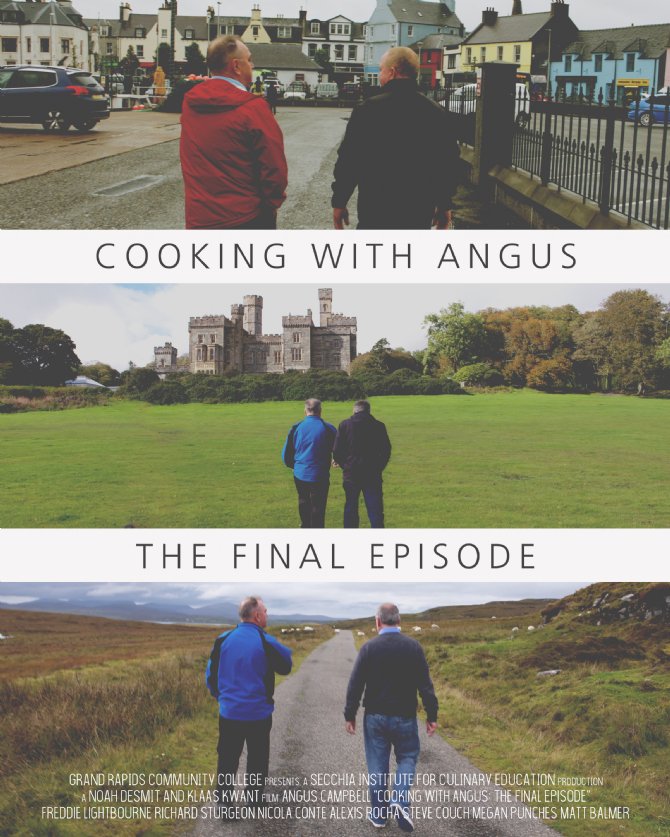
Angus also feels we should be more proactive in preserving the traditional dishes, which in a way were ahead of their time.
He said: “Nowadays the big push for everyone is ‘farm to table’. We’ve been doing farm to table for ever in Lewis, because we have an abundance of fresh produce from the sea, from the land, from the air. Everywhere we look we’ve got fresh produce we can use and I don’t think we do a good enough job of realising it.
“I don’t see grouse or pheasant on the menu. Everybody is complaining about deer but I don’t see venison on the menu. The beaches are covered in rabbits, thousands of them. The produce and the amount of stuff that we have available is incredible.”
Angus left Lewis at the age of 16 to begin a cooking and teaching career that would take him all over the world, including three years in the Bahamas in the 90s.
He credits his mother with igniting his passion for cooking and was “at my mother’s skirt tails, every day of my life”.
He said: “She’s great. The beginning of my bio is that I came from the Isle of Lewis and I got my passion for cooking from my mother – because it was exciting, because it was something that happened every single day and it was (always) different.”
Angus’s story of how he got his college teaching job in the Bahamas also illustrates the important part that being an islander has played in his life. During the interview he was asked “tell me about the Isle of Lewis” and after he replied the head of the panel said: “He’s the man for the job because he understands island life”.
The similarities would prove striking – such as seeing an old Bahamian man of Potters Cay, Nassau, slice a piece of konk off a larger piece that was hanging drying in the sun.
The man walked away chewing it, reminding Angus of when his grandfather would slice a bit of salt ling off a larger piece hanging on a pulley by the fire. He also went away chewing it.
“The similarities are dramatic because they had to preserve their food, the same as we did.”
Island life has been “instrumental in every single thing I’ve ever done”, said Angus.
“We ate well when we were kids. We never went hungry and it was right across the board, from a duff to salt mackerel to Ceann Cropic. It really opened my eyes. It gave you a good grounding into what food was all about. All you have to do is stuff a black pudding once and you’ll never be squeamish about anything again in your life. I still make them when I come home.”
While Angus’s demo and screening are taking place in Shawbost tonight, An Lanntair in Stornoway will be gearing up for the film festival’s official launch, which takes place at 7.30pm and will be followed by a screening of Patagonia’s Artifishal, which explores how wild salmon are under threat from fish farming and hatcheries.
The films programme gets underway in the morning, though, with screenings in An Lanntair and a number of the rural venues from about 10.30am. Check programme for details.
For more information on the festival visit: www.hebfilmfestival.org/hiff-2019
Tickets for the rural venues can be bought through the website by following the links to the Eventbrite marketplace but tickets for the An Lanntair films must be bought through the art centre’s own website at: www.lanntair.com.
Follow the Hebrides International Film Festival on social media – on Facebook at @HebFilmFestival and Twitter at @HebIntFilmFest – for regular updates.
09/09/19
FILMMAKER MASTERCLASSES AT FILM FESTIVAL
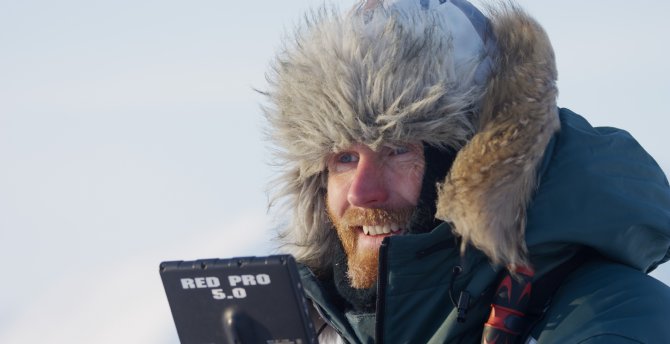
Two award-winning filmmakers are coming to the Hebrides International Film Festival in person this year to give masterclasses on their craft.
Extreme wildlife filmmaker and photographer Asgeir Helgestad (pictured above) and stop-motion animation director, set designer and model maker Catherine Prowse will both be giving masterclasses in the An Lanntair Pocket Cinema – Asgeir on Friday at 5.30pm and Catherine on Saturday at 2.30pm.
The film festival – taking place in venues across the Outer Hebrides from Thursday to Saturday (September 12 to 14) – is also screening films by Asgeir, from Norway, and London-based Catherine, so festival-goers will be able to enjoy their work as well as hearing about how they make it.
The films are Asgeir’s Queen Without Land, which follows the fortunes of a polar bear mother in the Norwegian Arctic archipelago of Svalbard, and Catherine’s Laymun (still image below), a short animation based in a war-torn Middle Eastern city where a woman fights the destruction and desolation around her by planting lemon trees.
Laymun has won three Royal Television Society awards, among others, and been screened at festivals around the world. In her masterclass, Catherine will be discussing her work and career, including how she creates the animations, followed by a question and answer session.
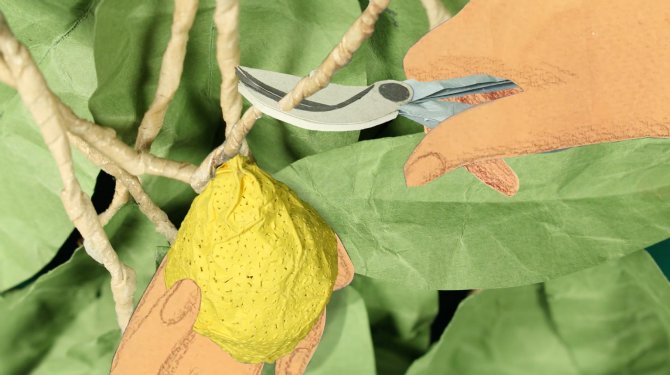
Multi-award-winning film Queen Without Land follows the story of beautiful polar bear Frost in Svalbard, the land of absolute darkness in winter and midnight sun in summer, where the disappearing sea ice has pushed life to the brink. As Frost is forced further inland, Asgeir is determined to find her and document all that is being lost, but his task is difficult and sometimes dangerous.
Asgeir has been working as a wildlife filmmaker and photographer since 1991 and been influenced by the vast landscapes, beautiful light and majestic animals of Norway, where he grew up.
He shoots in Ultra High Definition (8K), using the RED Epic W camera system, and his still photography and films have won him several international awards including prizes at the Wildscreen Film Festival and Wildlife Photographer of the Year. Queen without Land (still image below) has won several awards including Best Environmental Film at the WFF in 2018.
Asgeir’s masterclass will focus on camera work in extreme location and the skills needed to capture the natural environment and wildlife. He will also be bringing his message of ‘wildlife filmmaking as climate activism' to the film festival. And he too will do a question and answer session.
Asgeir said: “I have never been to the Hebrides before and I am so excited to come and experience the wonderful nature there.
“I suppose it can be cold and windy now, but possibly not comparable to Svalbard. On Svalbard temperature rarely gets under -35 to -40C, but in combination with wind that can feel quite insane, especially if flying a drone or using touch-screens which is difficult with gloves. I will talk about filming in the cold and about how it is to work with polar bears who might find you too interesting.
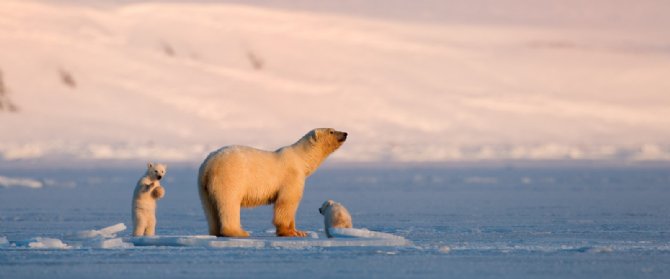
“Nevertheless, temperatures are rarely that cold anymore on Svalbard, as the average temperature has risen 5.6C and it even rains during the winter. This affects the whole ecosystem and even creates problems for reindeer that can't access their food when it’s covered with ice. These islands used to be surrounded by ice during the winter, but now it is more often surrounded by open water.”
The situation has moved beyond urgent, according to Asgeir.
“I am afraid it is too late to save the Arctic ecosystem as we know it. Our politicians will take action some time in the future, but the future is already here, and especially on Svalbard. Therefore, I would also like to discuss wildlife filmmaking as climate activism and what it means to be working in and for nature. I think it is important to have enough time for Q&A with the audience, as such issues need discussion and dialogue.”
Muriel Ann Macleod, Creative Director and Programmer of HIFF, is delighted to be providing the filmmaking masterclasses this year, thanks to funding from Highlands and Islands Enterprise.
She said: “It’s skills development so we’ve brought in people who have unusually high-quality skills and we’re opening it up to filmmakers and students in the Hebrides. We have a collective of people who are making film, young and old, and this is about encouraging everybody in the community to think about making more film and these filmmakers are inspiring people.”
Another aspect of bringing filmmakers into the islands is that “very often they don’t know about the place and what it looks like”, so they might end up wanting to make film here.
Muriel Ann said the filmmaking masterclasses were “not an easy thing to put together” because, as well as looking for people “who had something special”, they also had to have a recent film out, which the film festival could book, and they had to be available themselves.
“We are really grateful to both of them for coming here,” she said, “because it’s a chunk out of both their lives to do it, especially to come to the island.”
She said Asgeir was “very interesting because he goes out and does everything himself”, in extreme environments with his high-level equipment. “He’s putting his life at risk to do it and in the film you see him almost being eaten by a polar bear.”
Catherine (pictured below), meanwhile, is notable for being “a young talented individual, working in London and directing animation and making animation”. She is relatively new out of college but has won awards for her model making and paper animation.

“This is inspiring because this is what a young person has managed to do in a short period,” said Muriel Ann.
For more information, including details of all the screenings, visit: www.hebfilmfestival.org/hiff-2019. Printed programmes are also widely available.
Tickets for the rural venues can be bought through the website by following the links to the Eventbrite marketplace but tickets for the An Lanntair films must be bought through the art centre’s own website at: www.lanntair.com.
Follow the Hebrides International Film Festival on social media – on Facebook at @HebFilmFestival and Twitter at @HebIntFilmFest – for regular updates.
06/09/2019
CONVERSATIONS AIM TO BUILD ENGAGEMENT AROUND MARINE PROTECTION
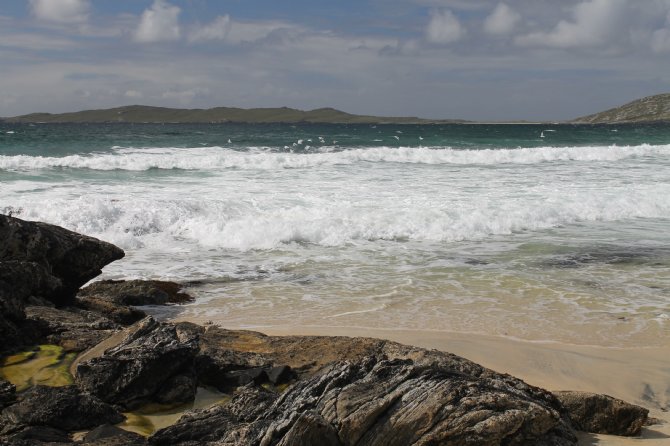
A series of conversations around marine management are being held during the Hebrides International Film Festival at six locations throughout the islands.
The Seas of the Outer Hebrides project team, made up of representatives from Creative Carbon Scotland, Scottish Natural Heritage and the University of the Highlands and Islands, will be present to introduce the project and hear your views on how we should best look after our marine environment.
The focus of the events will be: why are the seas important to you and what should our seas look like in 30 years’ time? The aim is to explore how communities can live sustainably with the sea both now and in the future by setting out a vision and later becoming involved in decision making. Over the next three years the Seas of the Outer Hebrides project aims to find a way to best manage Marine Protected Areas for the benefit of people and nature, and ensure everyone can continue to benefit from a healthy and productive ocean.
One short film being shown at three of the events is Muir An-Athraichean (Our Father’s Sea) which explores the cultural importance of fishing and some of the tensions between marine conservation and livelihood.
The film festival takes place at venues throughout the Outer Hebrides next week, from Thursday through to Saturday (September 12 to 14).
The SEASOH project will be at films shown at An Lanntair in Stornoway, Bernera Community Centre, Talla Na Mara community centre in South Harris, Carinish Village Hall in North Uist, Stoneybridge Village Hall in South Uist and in Castlebay Hall in Barra.
See the online programme at www.hebfilmfestival.org for more information.
In addition to the conversations, drop-in animation workshops are being held during the festival, aimed at exploring the future of our seas through art.
WORKSHOPS
By working with the artists such as Steve Tod, participants will get the chance to produce an animation of their own by using drawings, paintings, collages, sculptures and sound.
Materials and help will be provided and the workshops are suitable for people of all ages. Images produced over the course of the festival will then be gathered and produced into a short film by Rural Nations filmmakers.
In Stornoway, the drop-in animation workshops will be in the pop-up cinema in the library from 12.30pm to 5pm on the Thursday and 10am to 5pm on the Friday and Saturday. In North Uist, the workshops are in the pop-up cinema being run by Uistfilm at Taigh Chearsabhagh, between 11am and 5pm on Thursday, Friday and Saturday.
Muriel Ann Macleod, creative director and programmer of the Hebrides International Film Festival, said the conversations and the animation workshops were “a very hands-on way” of trying to get people to think about the issues.
She said: “It might be that 10 per cent of the Uists are under water in 30 years’ time. We don’t know if that will happen but it might. It’s about getting people to think about what they need to do now in order to avoid or adapt to this kind of looming catastrophe.”
The role of Creative Carbon Scotland in the conversations is to bring a “creative and cultural angle to the engagement process”.
Gemma Lawrence, Culture/SHIFT Producer with Creative Carbon Scotland said: “The ultimate aim of the project is to come up with a Marine Protected Area management plan for the Outer Hebrides – and to do that in a way that puts communities at its heart.
CLIMATE CHANGE
“Understanding what’s important to people, how they live with the sea now and how they would like to live with the sea in the future is vital to that process. We’d like to hear about all kinds of different activities but also about how people relate to the sea on a cultural, creative or spiritual level.”
She added: “From Creative Carbon Scotland’s perspective, we work to help connect the worlds of culture and climate change and one of the ways we do that is helping to introduce creative approaches into environmental projects.
“Our rationale is that environmental issues and climate change are often approached from a scientific and economic perspective but that misses out the social and cultural angle and we believe that culture and art is a really effective way of thinking about these issues and that climate change is as much an issue of our culture and the way we live.”
Taking a creative approach, she said, “helps to synthesise issues in a different way and present them back to us through a different medium”. It is also particularly relevant to areas such as the Outer Hebrides which have such a strong cultural heritage.
The Seas of the Outer Hebrides project is running for three and a half years and is part funded by the European Union’s Interreg fund through the wider MarPAMM (Marine Protected Area Management and Monitoring) project.
LISTENING
Project Officer Charlie Main, who is based at Lews Castle College UHI, said they aim to deliver effective management for Marine Protected Areas. She stressed they were “trying to do a lot of listening”, particularly with fishermen and other people who make their livelihood from the sea.
Charlie said: “The seas around the Outer Hebrides are so important for both people and nature. If we’re going to be able to hand on this fantastic environment and the benefits we all derive from it to future generations, then we need to get together to build consensus on conservation and management. Marine Protected Areas have been controversial in the Outer Hebrides and we recognise that.
“With these events and others over the next three years, we’re trying to find a way in which people and agencies can work together towards a shared vision for the future of our seas.”
She added that the film festival and its “fantastic programme of thought-provoking films” had given the project “a really exciting opportunity” to begin that conversation.
05/09/2019
'REALLY GOOD SELECTION OF FILMS' AS HIFF RETURNS TO CASTLEBAY
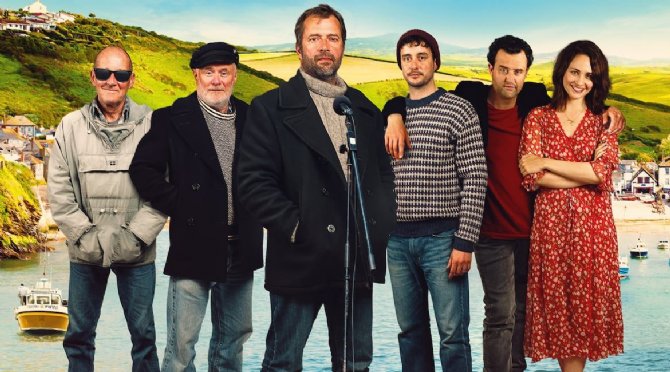
Hebrides International Film Festival volunteer Sarah Maclean is looking forward to the event in Barra on the Friday and Saturday, September 13 and 14. It is returning to the Castlebay Hall after being held in Northbay and Vatersay the previous two years – and preparations are underway for movie snacks with a difference, which will be sold in aid of charity.
Sarah said: “We’re looking forward to it. It’s always nice to have the film festival down here. This year we’ve got Cafe Kisimul, who will be making popcorn for charity. They are experimenting with different recipes, so we’re really looking forward to that.”
Some of the films being shown were funny, while others were thought-provoking, said Sarah.
“I think it’s a really good selection,” she added.
“I’m looking forward to Fisherman’s Friends (pictured above) and I hope all the kids are looking forward to Early Man because I think that will be really, really funny. I’m also looking forward to Storm Boy, Happy as Lazzaro and Soldiers Without Guns – I think that will be a good one.”
Sarah said it had been “really difficult” to choose the films for Barra and added: “We hope that the Barra people will enjoy them all”.
This is Sarah’s fourth year volunteering at the film festival and she noticed a dip in the audience numbers when it was moved out of Castlebay.
“The first year it was in Castlebay Hall and the turnout was quite good. The next two years we had it in Northbay and in Vatersay, so the turnout wasn’t as good. We’re really looking forward to it being back in Castlebay and hopefully lots of people will come and support it.”
Personally, Sarah said: “I really enjoy it. It’s great seeing the films. It’s a nice job to have.”
02/09/2019
PREVIEWING SOME OF THE DELIGHTS OF HIFF 2019
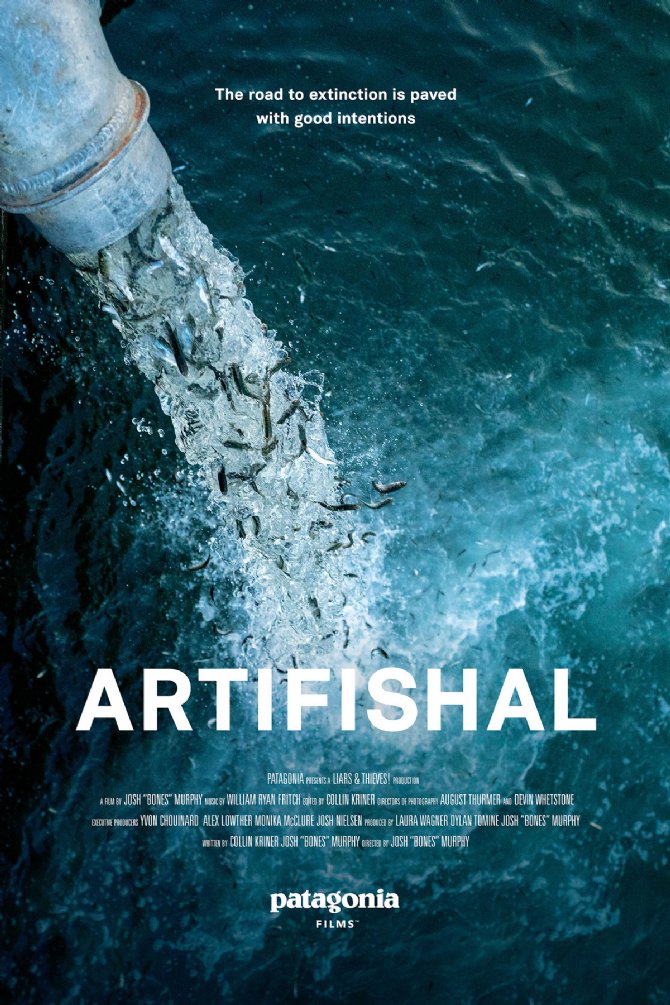
What do fish farms, renegade environmentalists, Native American Indians, cartoon ladybirds and a choir of sea-shanty-singing Cornish fishermen have in common?
The answer is they all feature in films being shown as part of this year’s Hebrides International Film Festival, taking place in venues across the Outer Hebrides from September 12 to 14.
A total of 74 film screenings will take place in venues from the Butt to Barra, featuring a large variety of genres, as is the case every year at HIFF. There are 12 venues altogether, with each one making its own choices about which films to show from the 2019 HIFF programme.
In most cases, the films being shown in the rural venues were selected by the local volunteers who will be running the event in their community, with guidance from the festival’s creative director and programmer Muriel Ann Macleod.
All films in the programme are the best of current world cinema – to be included in HIFF, a film must have been made within the last three years – and many works being shown at this year’s festival are being screened exclusively at HIFF and for the first time in the UK.
Muriel Ann gave her recommendations for some of the must-see films, and explained how she goes about building the programme for the film festival.
“I searched the world for films that were award-winning and high quality. I have a bias for Scandinavia and the North American indigenous people for example – especially films that explore their language and its preservation.”
“There’s a big selection this year. You can’t see them all, that’s for sure. You’ve got to be selective. This year’s theme is 'islands, environments and remote communities', with a particular focus in 2019 on sustainable fishing.”
In line with this, Muriel Ann has selected a number of films about the industry and its impacts. One of the highest profile films this year is Patagonia’s Artifishal, by director Josh Murphy, which is opening the festival in An Lanntair on the Thursday night and is also showing in Shawbost, Carinish and Castlebay.
Murphy’s documentary is about the impact of fish farming and hatcheries on wild salmon and the environment that supports them.
It is being preceded in An Lanntair by a talk on wild salmon by writer Michael Wigan.
Muriel Ann said: “This is a big issue for us because of the employment factor. People are employed to run these fish farms but there are big environmental implications.”
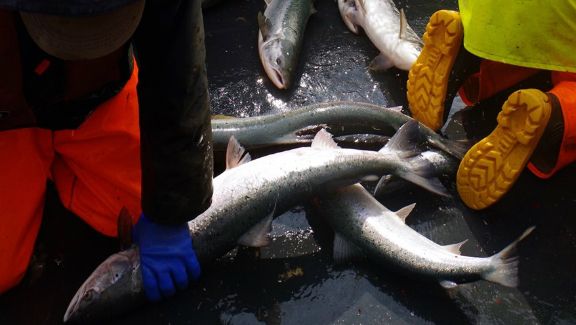
Another big film with a fishing narrative is Of Fish and Foe, on in An Lanntair and Talla Na Mara. It tells the story of the Pullars, a traditional salmon fishing family whose methods include the shooting of seals. This brings them into conflict with environmental activist groups Sea Shepherd and Hunt Saboteurs.
The documentary puts modern environmentalism under the microscope, challenging viewer preconceptions about whose side they might be on.
Other documentaries include Anthropocene: The Human Epoch (An Lanntair and Carinish), an exploration through stunning imagery of the way humans are shaping our planet, and Free Solo (Bernera Community Centre and Talla Na Mara) – “this year’s climbing film” – about the 3000ft ascension of El Capitan without ropes.”
Soldiers Without Guns, The Reluctant Radical and A Modern Shepherdess are also among the documentaries. Soldiers Without Guns (An Lanntair Pocket Cinema and Castlebay Hall) tells the story of the New Zealand army who, when they intervened in a coup on a Pacific island, took their guitars instead of weapons.
The Reluctant Radical (An Lanntair Pocket Cinema and Taigh Dhonnachaidh) features activist Ken Ward, whose stance over climate change puts him in the direct path of the fossil fuel industry. A Modern Shepherdess (An Lanntair Pocket Cinema, Taigh Dhonnachaidh, Shawbost and Talla Na Mara) is about a French single mother who quits Parisian life to run a farm and is described as inviting the viewers to question how much their lives are in keeping with who they really are.
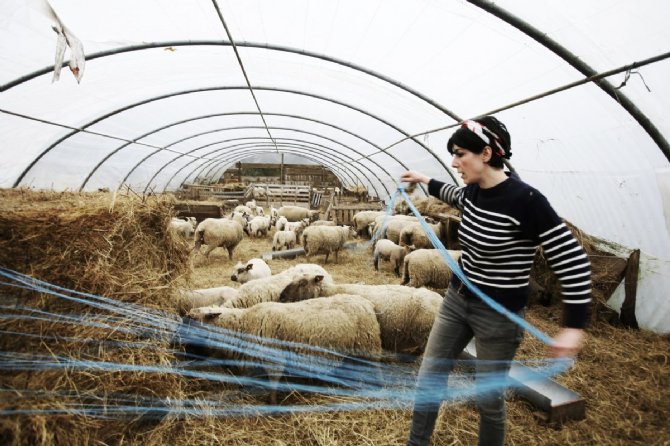
“It’s really lovely,” said Muriel Ann, adding: “I think I’ve catered for a lot of tastes.”
As well as documentaries, the programme also features drama, children’s cinema and shorts. A big element of the programme is political and environmental but there is also comedy and popular film, and film from hot countries as well as cold ones.”
In the drama section, Muriel Ann identified Manta Ray and Bait, both only showing in An Lanntair, as two of her own favourites.
Muriel Ann said: “An Lanntair has a fairly big chunk of the programme and it has some big dramas. Films like Manta Ray, Bait and The Mustang are only available in An Lanntair because it’s early in the festival booking and we can only get them in one format. Same for Tito and The Birds and A Miniscule Adventure, from the children’s programme.”
Manta Ray follows the story of a fisherman and an injured stranger whom he nurses back to health. It is set off the coast of Thailand and is one of Muriel Ann’s favourites.
The programme describes it as a “striking meditation on identity” and “a film of exquisite beauty that finds moments of transcendence in the context of immense brutality”. Muriel Ann said: “It’s a very visceral film. It’s beautifully filmed and it’s a very interesting story.”
She described Bait – along with another of this year’s choices, The River – as “experimental”. Shot in black and white and made locally in Cornwall, it follows the story of a cove of fisherman who finds himself without a boat, after his brother repurposed their father’s vessel as a tourist tripper for the London rich. He also finds himself displaced from his family home and seeks to restore their culture and traditional practices to the way they were.
“We understand these issues,” said Muriel Ann. “We know about these issues about people taking over the fishermen’s cottages and not understanding the local culture. It’s about trying to keep a culture alive.”
Two other dramas in this year’s selection — Happy as Lazzaro (An Lanntair, Shawbost and Castlebay) and Neither Wolf Nor Dog (An Lanntair, Bernera, Scalpay and Carinish) — highlight “what the festival is all about”, according to Muriel Ann, because they help us to “reflect on our culture by seeing what other people in remote cultures do”.
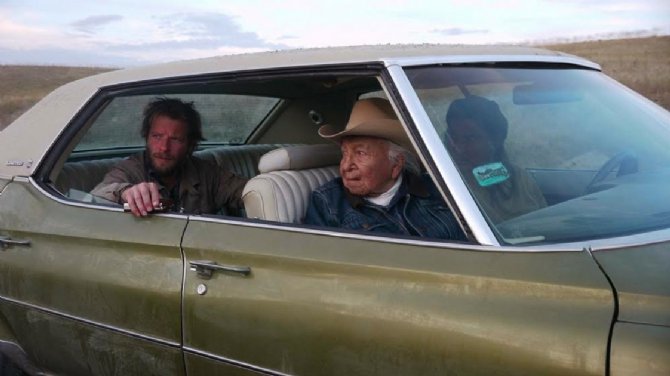
Referring to Neither Wolf Nor Dog, an American Indian film starring a 95-year-old Indian elder, she said: “It’s a kind of road movie, a coming of understanding. It’s a reflective film. You’re looking at this incredible world where people lived for centuries where they’re no longer allowed to live freely. It might seem like nothing to do with us but when people are struggling to keep their language and culture alive, maybe it does have something to do with us.”
On the light side, Fisherman’s Friends is one of the most ‘popular’ films in this year’s programme, and is about 10 fishermen from Cornwall who make the top 10 with their album of sea shanties. A cynical London music executive is pranked into signing them but, as he’s drawn deeper into their way of life, he begins to question his own integrity and values.
A “feel good movie”, Fisherman’s Friends is showing in Taigh Dhonnachaidh, Bernera, Talla Na Mara, Stoneybridge and Castlebay.
There are six films for children this year and 16 shorts, including Greta and The Snowman, which profiles teen activist Greta Thunberg, and Solas, the piece by Fiona J Mackenzie documenting the life and work of Gaelic folklorist Margaret Fay Shaw. Both these shorts are showing in many of the rural venues and Greta and The Snowman is in An Lanntair too.
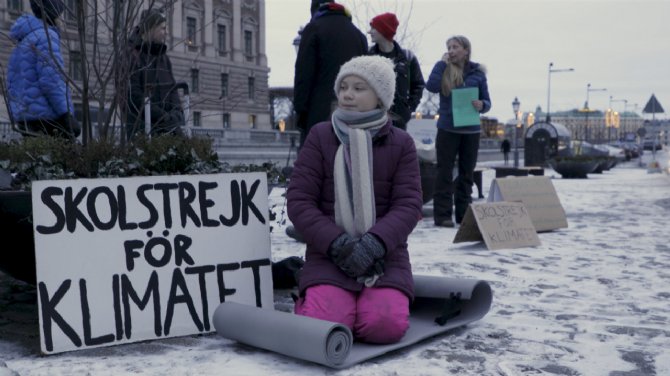
Each short gets paired with a feature-length film, such as Robert Redford’s The Mustang and short Inhale, which are showing in An Lanntair on the Saturday night.
Inhale is about a man trying to come to terms with the death of his wife and daughter, through his horses and his desire “to move in harmony with his pain”.
Recognising the difficult subject matter, Muriel Ann said: “It’s part of life. We have to be prepared to talk about these issues.” She added that it was important to offer such films as part of a selection “in a film festival situation”. Festival Producer Ruaraidh Urpeth is a fan of Inhale, describing it as “beautiful” and “a complete cinematic achievement”.
Inhale, directed by Sean Mullan, is just 15 minutes long. But, as Muriel Ann said: “Sometimes a short can be sufficient in a particular subject. That’s why I’ve got short films in the programme and they’ve all got a specific purpose. I think it’s a form that we don’t respect enough in this country. We see it as a tester or a route to make a feature from and not as art in and of themselves.”
For more information on the festival visit: www.hebfilmfestival.org/hiff-2019
Tickets for the rural venues can be bought through the website by following the links to the Eventbrite marketplace but tickets for the An Lanntair films must be bought through the art centre’s own website at: www.lanntair.com.
Follow the Hebrides International Film Festival on social media – on Facebook at @HebFilmFestival and Twitter at @HebIntFilmFest – for regular updates.
21/08/2019
HIFF 2019 IS LIVE!!
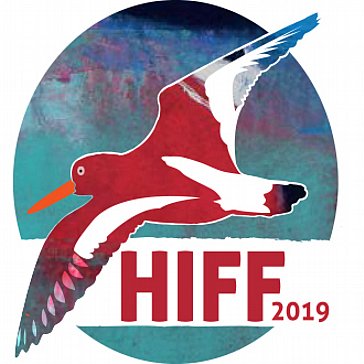
We're delighted to announce that HIFF will be returning from the 12th through the 14th of September, 2019. We're screening tens of feature and short films from all over the world, exploring this year's theme - Islands, Environments and Remote Communities.
See our brochure for the full list of screenings, venues, events and times.
Read journalist Katie Laing's recent article about HIFF below...
The Hebrides International Film Festival is back for 2019. It will take place at venues throughout the Outer Hebrides – from the Butt to Barra – from September 12 to 14.
There will around 78 screenings at 12 venues over the three days, from Thursday through to Saturday, with final arrangements now being made for the event.
The Hebridean International Film Festival grew out of a programme started by Regional Screen Scotland six years ago, where a number of remote and rural film festivals were given three-year funding and mentorship. It was also a natural successor to the Hebrides Coastal Film Festival.
For programmer and director Muriel Ann, her original involvement came out of wanting to make a shift from theatre into filmmaking.
“For me, it’s been an education in what cinematic film is, and what good quality film is. You know that these films can make change. We’ve seen it. It’s gobsmacking when you screen these films and people come out, saying, ‘What?! – I never knew any of that!’ People need to know what’s happening in the world and these films show you. That’s the bottom line.”
Muriel Ann has chosen films “that have an impact on the big screen” and said the film festival would be “as accessible as possible”. All screenings at An Lanntair's Pocket Cinema are free and general ticket prices have been held as low as possible.
Muriel Ann stressed the quality of the films that would be on offer and said such films could not normally be seen in the Outer Hebrides – nor on television.
“The world of film is pretty huge and we’re really very lucky to get them as they’re not on general release - and the documentaries are stunning. They are cinematic documentaries – it’s not something that’s going to look so good on a smaller screen or TV – and I think there’s some really strong political environmental films.
“We’re looking at issues around fish farming – we’ve not been shy on issues that are relevant to the island – but all of these films are a really good experience because of their quality.
“The dramas are connected to rural communities but they’re still thrillers, experimental, and some are just really good fun like Fisherman’s Friends.
“It’s a really varied programme. I was trying to find films that would connect with our communities and give a big international perspective and change how we think about the environment and how we deal with our environment and climate change – because that’s what it’s about.
“It’s not just a few environmental films made in the back of beyond. These are high-quality films that promote the issues or high-level drama that just happens to be about the theme.”
Muriel Ann added: “It is niche and it has to be niche because it’s a unique festival. I’m fully committed to it being about remoteness and environments. That’s interesting, I think.”
The Hebrides International Film Festival – supported by Screen Scotland, HIE and other agencies – is curated by Muriel Ann Macleod, director of Rural Nations Community Interest Company, and aims to bring the very latest in world cinema to the islands.
Only films made within the last three years are eligible to be included in the programme and all must fit within the festival’s broad theme of “islands, environmental issues and indigenous peoples”, with a particular focus this year on sustainable fishing.
Cinematic documentaries with a political or environmental theme feature strongly – the main film in An Lanntair on opening night will be Artifishal, a documentary about the impact of fish farming on wild salmon stocks – but there are a variety of genres in the programme, also including drama, comedy and children’s film.
Each screening will include a feature film and an accompanying short. The films are a mix of English language features and foreign films with full English subtitles.
Tickets are priced at £8 and £5 for the An Lanntair showings and £6 and £4 at the rural venues. A festival pass, allowing access to any film anywhere, is available for £35.
Tickets for the rural venues can be bought through the website by following the links to the Eventbrite marketplace but tickets for the An Lanntair films must be bought through the art centre’s own website, at lanntair.com.
In general, tickets can also be bought at venue doors, although it is advisable to book in advance for the smaller venues, where space is more limited.
There will also be special daytime screenings for school groups and a number of masterclasses, lectures and other special events including Whale Watching at Tiumpanhead and drop-in animations. Full details of the masterclasses and lecturers will also be available on the website.
Artwork for this year’s film festival is by Caroline Bailey, whose paintings were discovered by Muriel Ann at Morven Gallery. The cover for the brochure is a painting called ‘Across Stornoway Harbour’, emphasising the fishing theme.
By Katie Laing.
19/09/2018
If HIFF does anything this year, it will “make us pause for a minute and think about what we are doing to the planet and to the island”.
That was the message from the film festival curator Muriel Ann Macleod on today’s opening day of the festival (September, 2018).
The fifth Hebrides International Film Festival is taking place in venues throughout the Outer Hebrides from now until Saturday – and Muriel Ann said it raises “important questions locally”, such as whether we were “really doing enough to preserve the seas of the Hebrides”.
Muriel Ann, director of the Rural Nations Community Interest Company, was speaking from Brussels, where she is representing the Outer Hebrides as part of the Reclaim the Future project, part-funded by Creative Europe.
She said: “I’ve brought our short exhibition environmental film Eve v Lucy and the Harris Carnival banner representing the islands. But of course I’d rather be in Lewis for the opening of HIFF on Wednesday night. I’m really pleased with the festival.
“This year we engage with cultural diversity with films like Lerd – A Man of Integrity, as well as strong environmental films like Blue and A River Below, with questions asked around the importance of the environment next to big business and the driver to make money.
“These are important questions locally. How many wind farms do we need when we could have solar farms or wave power?
“If the film festival does anything this year, perhaps it will make us pause and think for a minute about what we are doing to the planet and to the island.”
Three big wind farm schemes are planned for the Isle of Lewis – the Forsa development at Tolsta and Lewis Wind Power’s Stornoway Wind Farm project and Uisenis scheme in Eishken. Lewis Wind Power is part-owned by French multinational EDF Energy and wants to be allowed to site offshore-sized turbines on land on Lewis.
The core of this year’s film festival is the screening of current environmental documentary features such as Blue, which has been described by Greenpeace as “a cinematic song for our oceans”. It was filmed in Australia, Indonesia, the Philippines, South Pacific and United States.
Similarly, A Plastic Ocean was shot over four years at 20 locations across the planet and shines a light on the plastic pollution crisis.
However, environmental questions relating to land also get the HIFF treatment, with Lerd – A Man of Integrity opening the film festival tonight in An Lanntair.
Lerd, which won the Un Certain Regard Award at the Cannes Film Festival, is about a gold fish farmer in a village in northern Iran, whose attempts to make an honest living come up against a corrupt system, where money and power beat environmental concerns.
The fish farmer finds out his neighbour has poisoned the water in a bid to get control of his land.
Muriel Ann said: “He wants to have something done about this but you learn that the whole society works on bribes and there’s nothing he can do. It makes you reflect on your own society in a way. It shows that in small communities local people have no real say in how to control things…
“I thought it was interesting because of how unimportant the environmental issue was. It was about who owned what and who was making money.”
All the films on the Hebrides International Film Festival have been chosen because “they are the best from current world cinema”, having been made within the last three years. Many are award winners and all are high quality.
There are approximately 26 feature films on the programme and there will be a total of 56 screenings across the venues over the four days, with each screening including a feature film and an accompanying short.
There are around 13 ‘shorts’ on the programme including Cianalas, by young Hebridean Zoe Paterson Macinnes, and MS, Mexico and Me which tells the story of Aileen Hunt who travelled from her home in Uig to Mexico for stem cell treatment, in a bid to halt the progression of multiple sclerosis.
The Hebrides International Film Festival is supported by Creative Scotland, HIE and other agencies and presented in collaboration with An Lanntair.
The festival has a broad theme of “islands, environmental issues and indigenous peoples” and a particular focus on the “ocean” theme this year, although it always includes a variety of genres, so there is art, comedy and children’s film as well as drama and documentary.
By Katie Laing
07/09/2018
The fifth Hebrides International Film Festival, 2018.
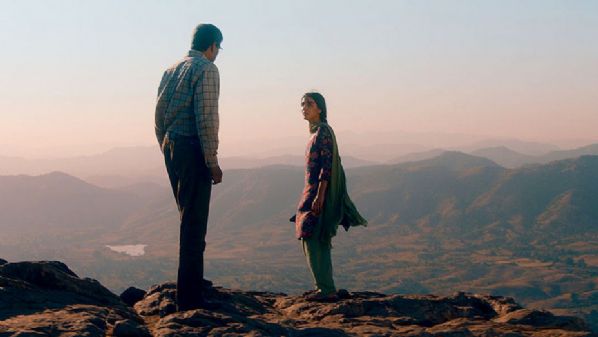
Final preparations are underway for the fifth Hebrides International Film Festival – taking place throughout the Outer Hebrides from Wednesday, 19 September to Saturday, 22 September.
The festival, which is supported by Creative Scotland, HIE and other agencies and presented in col-laboration with An Lanntair, has developed into a high-quality event, which brings the latest in world cinema to the islands.
Only films made within the last three years are eligible to be included in the programme, which is curated by Muriel Ann Macleod, director of the Rural Nations Community Interest Company, with the support of Paul Taylor, the cinema programmer at Eden Court Theatre.
All the films being shown fit within the festival’s broad theme of “islands, environmental issues and indigenous peoples” and this year there is a particular focus on the “ocean” theme.
Although there are variety of genres in the programme – including art, comedy, children’s film, drama and surf film – there is always a strong element of documentary or political and environmen-tal commentary, and two of the biggest films this year document what is going on within our oceans and rivers. In particular, the global environmental crisis of plastic pollution.
One of the headline documentaries, Blue, has been described by Greenpeace as a “cinematic song for our oceans; beautiful, intimate and grand” and was filmed in Australia, Indonesia, the Philip-pines, South Pacific and United States.
Similarly, A Plastic Ocean was shot over four years at 20 locations across the planet and documents how wildlife – and people – are living among the toxic refuse.
As well as having been made within the last three years, all the films on the programme are chosen for their high quality and many are award winners.
There are approximately 26 feature films on the programme and there will be a total of 56 screen-ings across the venues over the four days, with each screening including a feature film and an ac-companying short. There are around 13 ‘shorts’ on the programme including Cianalas by young Hebridean Zoe Paterson Macinnes, which is currently being well received.
The films are a mix of English language features and foreign films with full English subtitles. The full programme is available online now – at www.hebfilmfestival.org – and tickets can also be bought through the website by following the links to the Eventbrite marketplace.
For festival films that are being shown at An Lanntair, tickets are available via their website (not Evenbrite) – at lanntair.com – and they also have a series of free films on in their Pocket Cinema.
In general, tickets can also be bought at venue doors, although it is advisable to book in advance for the smaller venues, where space is more limited. Tickets are priced £7 adults, £5 concession and £4 for under-16s, with a season ticket for £50 which allows entry to everything.
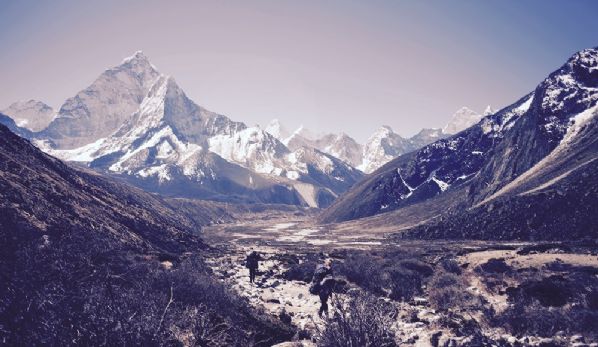
There will also be special daytime screenings for school groups and a number of masterclasses from film makers, as well as environmental lectures and a beach clean. Full details of the masterclasses and lecturers are also available on the website.
Programmes are also being printed and will be widely distributed.
The Hebridean International Film Festival grew out of a programme started by Regional Screen Scotland five years ago, where a number of remote and rural film festivals were given three-year funding and mentorship. It was also a natural successor to the Hebrides Coastal Film Festival.
For programmer and director Muriel Ann, her original involvement came out of wanting to make a shift from theatre into filmmaking.
“For me, it’s been an education in what cinematic film is and what a good quality film is. You know that these films can make change. We’ve seen it. It’s gobsmacking when you screen these films and people coming out, saying, ‘What?! – I never knew any of that!’
“So what a fantastic thing to get to do. People need to know what’s happening in the world and these current films show you. That’s the bottom line.”
Follow the Hebridean International Film Festival on Twitter @HebIntFilmFest
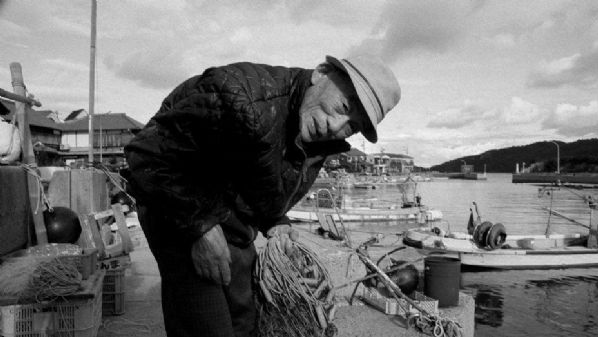
25/08/2018
HIFF will run between Wednesday 19th- Saturday 22nd September 2018.
We're delighted to have several highly anticipated environmental features coming to the festival this year, including BLUE an Australian documentary by director Karen Holden.
BLUE is a cinematic song for our oceans; beautiful, intimate and grand. Fearlessly truth-telling, yet passionately hopeful. See this film and you will want to rise up with the waves.”
— GREENPEACE AUSTRALIA
Find out more about the film and how you can take action here. Screening details for HIFF will be announced shortly.
21/10/2017
The HIFF team were very sorry to hear about the sad passing of film maker Roger Stotesbury whose short film Hand Woven Lives screened at the Hebrides International Film Festival in September 2017. The film was made on the Isle of Lewis with local residents in 2016. At this time Roger attended HIFF 2016 contributing to our masterclasses and formation of a film collective. He presented his film to us for screening at the 2017 festival, where it was very well received by locals who appreciated seeing local stories captured sensitively and portrayed beautfully in the short doc which screened throughout the islands venues.
We would like to thank Roger for his contribution to film, for capturing our lives here and sharing this with the world, and for his enthusiasm and appreciation for the Hebrides.
Read more about Roger's film making at Cut to the Doc.

